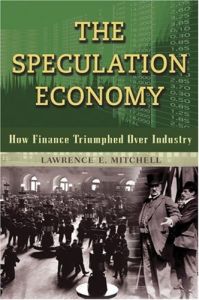Join getAbstract to access the summary!

Join getAbstract to access the summary!
Lawrence E. Mitchell
The Speculation Economy
How Finance Triumphed Over Industry
Berrett-Koehler, 2008
What's inside?
Discover how America’s obsession with the stock market led to widespread speculation.
Recommendation
Scholar Lawrence E. Mitchell makes his case about the speculative nature of the American economy in a complex, highly annotated volume. His detailed presentation explores historic, social, academic, legal and regulatory forces that shaped financial capitalism, especially in the late 1800s and the early 1900s. He depicts an American infatuation with speculative stock market investments and describes efforts by the federal government to nurture stock appreciation and provide regulatory protections for the average investor. getAbstract recommends this slice of financial history to readers interested in the early turning points that shaped modern American capitalism.
Summary
About the Author
Lawrence E. Mitchell is Theodore Rinehart Professor of Business Law at The George Washington University Law School. A former corporate lawyer, he has been a corporate and business law scholar for 20 years. Mitchell is one of the founders of the progressive corporate law movement named after his 1995 collection, Progressive Corporate Law. He is the author of Stacked Deck: A Story of Selfishness in America and Corporate Irresponsibility: America’s Newest Export as well as casebooks on corporate law and finance.

















Comment on this summary